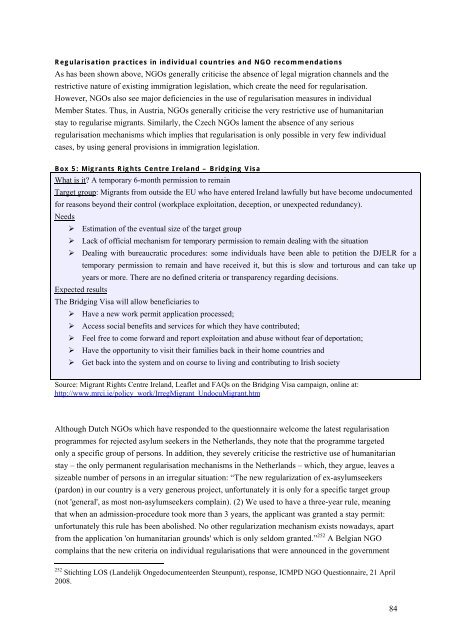REGINE Regularisations in Europe Final Report - European ...
REGINE Regularisations in Europe Final Report - European ...
REGINE Regularisations in Europe Final Report - European ...
Create successful ePaper yourself
Turn your PDF publications into a flip-book with our unique Google optimized e-Paper software.
Regularisation practices <strong>in</strong> <strong>in</strong>dividual countries and NGO recommendations<br />
As has been shown above, NGOs generally criticise the absence of legal migration channels and the<br />
restrictive nature of exist<strong>in</strong>g immigration legislation, which create the need for regularisation.<br />
However, NGOs also see major deficiencies <strong>in</strong> the use of regularisation measures <strong>in</strong> <strong>in</strong>dividual<br />
Member States. Thus, <strong>in</strong> Austria, NGOs generally criticise the very restrictive use of humanitarian<br />
stay to regularise migrants. Similarly, the Czech NGOs lament the absence of any serious<br />
regularisation mechanisms which implies that regularisation is only possible <strong>in</strong> very few <strong>in</strong>dividual<br />
cases, by us<strong>in</strong>g general provisions <strong>in</strong> immigration legislation.<br />
Box 5: Migrants Rights Centre Ireland – Bridg<strong>in</strong>g Visa<br />
What is it? A temporary 6-month permission to rema<strong>in</strong><br />
Target group: Migrants from outside the EU who have entered Ireland lawfully but have become undocumented<br />
for reasons beyond their control (workplace exploitation, deception, or unexpected redundancy).<br />
Needs<br />
‣ Estimation of the eventual size of the target group<br />
‣ Lack of official mechanism for temporary permission to rema<strong>in</strong> deal<strong>in</strong>g with the situation<br />
‣ Deal<strong>in</strong>g with bureaucratic procedures: some <strong>in</strong>dividuals have been able to petition the DJELR for a<br />
temporary permission to rema<strong>in</strong> and have received it, but this is slow and torturous and can take up<br />
years or more. There are no def<strong>in</strong>ed criteria or transparency regard<strong>in</strong>g decisions.<br />
Expected results<br />
The Bridg<strong>in</strong>g Visa will allow beneficiaries to<br />
‣ Have a new work permit application processed;<br />
‣ Access social benefits and services for which they have contributed;<br />
‣ Feel free to come forward and report exploitation and abuse without fear of deportation;<br />
‣ Have the opportunity to visit their families back <strong>in</strong> their home countries and<br />
‣ Get back <strong>in</strong>to the system and on course to liv<strong>in</strong>g and contribut<strong>in</strong>g to Irish society<br />
Source: Migrant Rights Centre Ireland, Leaflet and FAQs on the Bridg<strong>in</strong>g Visa campaign, onl<strong>in</strong>e at:<br />
http://www.mrci.ie/policy_work/IrregMigrant_UndocuMigrant.htm<br />
Although Dutch NGOs which have responded to the questionnaire welcome the latest regularisation<br />
programmes for rejected asylum seekers <strong>in</strong> the Netherlands, they note that the programme targeted<br />
only a specific group of persons. In addition, they severely criticise the restrictive use of humanitarian<br />
stay – the only permanent regularisation mechanisms <strong>in</strong> the Netherlands – which, they argue, leaves a<br />
sizeable number of persons <strong>in</strong> an irregular situation: “The new regularization of ex-asylumseekers<br />
(pardon) <strong>in</strong> our country is a very generous project, unfortunately it is only for a specific target group<br />
(not 'general', as most non-asylumseekers compla<strong>in</strong>). (2) We used to have a three-year rule, mean<strong>in</strong>g<br />
that when an admission-procedure took more than 3 years, the applicant was granted a stay permit:<br />
unfortunately this rule has been abolished. No other regularization mechanism exists nowadays, apart<br />
from the application 'on humanitarian grounds' which is only seldom granted.” 252 A Belgian NGO<br />
compla<strong>in</strong>s that the new criteria on <strong>in</strong>dividual regularisations that were announced <strong>in</strong> the government<br />
252 Sticht<strong>in</strong>g LOS (Landelijk Ongedocumenteerden Steunpunt), response, ICMPD NGO Questionnaire, 21 April<br />
2008.<br />
84
















